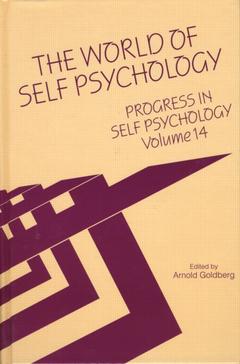Progress in Self Psychology, V. 14 The World of Self Psychology
Coordonnateur : Goldberg Arnold I.

Volume 14 of Progress in Self Psychology, The World of Self Psychology, introduces a valuable new section to the series: publication of noteworthy material from the Kohut Archives of the Chicago Institute for Psychoanalysis. In this volume, "From the Kohut Archives" features a selection of previously unpublished Kohut correspondence from the 1940s through the 1970s. The clinical papers that follow are divided into sections dealing with "Transference and Countertransference," "Selfobjects and Objects," and " Schizoid and Psychotic Patients." As Howad Bacal explains in his introduction, these papers bear witness to the way in which self psychology has increasingly become a relational self psychology - a psychology of the individual's experience in the context of relatedness. Coburn's reconstrual of "countertransference" as an experience of self-injury in the wake of unresponsiveness to the analyst's own selfobject needs; Livingston's demonstration of the ways in which dreams can be used to facilitate "a playful and metaphorical communication between analyst and patient"; Gorney's examination of twinship experience as a fundamental goal of analytic technique; and Lenoff's emphasis on the relational aspects of "phantasy selfobject experience" are among the highlights of the collection. Enlarged by contemporary perspectives on gender and self-experience and a critical examination of "Kohut, Loewald, and the Postmoderns," Volume 14 reaffirms the position of self psychology at the forefront of clinical, developmental, and conceptual advance.
Strozier, From the Kohut Archives. Part I: Clinical Transference and Countertransference.Coburn, Patient Unconscious Communication and Analyst Narcissistic Vulnerability in the Countertransference Experience. Mermelstein, The Figure-Ground Relationship of the Selfobject and Repetitive Dimensions of the Transference. Stern, Template or Transference: Some Thoughts About Mark Gehrie's "Empathy in Broader Perspective." Hilke, The Playing Through of Selfobject Transferences of a Nine-Year-Old Boy. Gorney, Twinship, Vitality, Pleasure. Wada, The Loss and Restoration of the Sense of Self in an Alien Culture: An Application of the Concept of the Twinship Selfobject Function. Livingston, Dreams, the Understanding-Explaining Sequence, and the Facilitation of Curative Process. Lenoff, Phantasy Selfobjects and the Conditions of Therapeutic Change. Kohl, Selfobject Need Conflict and Loss Experience: A Hidden Potential. Levene, Babiak, Dyadic Capacity: Progress in Narcissistic Development. Preston, Expressive Relating: The Intentional Use of the Analyst's Subjectivity. Cobb, The Development of a More Than Binary Self: Constructing a Common Language Between the Therapist and a Primitively Organized Schizoid Patient. Part II: Gender.Brothers, Exploring the "Bi" Ways of Self-Experience: Dissociation, Alter Ego Selfobject Experience, and Gender. Kaufmann, Sex, Gender, and Intersubjectivity: The Two Analyses of Mr. G. Part III: Self Psychology Applied.Teicholz, Self and Relationship: Kohut, Loewald, and the Postmoderns. Corbett, Cohen, The Freud-Jung Break: Reflections and Revisions in the Light of Psychoanalytic Self Psychology.
Arnold Goldberg, M.D., is the Cynthia Oudejan Harris, M.D. Professor, Department of Psychiatry, Rush Medical College in Chicago, and Training and Supervising Analyst, Institute for Psychoanalysis, Chicago. He is the author of a number of books, including Being of Two Minds: The Vertical Split in Psychoanalysis (TAP, 1999) and Errant Selves: A Casebook of Misbehavior (TAP, 2000).
Date de parution : 11-1998
15.2x22.9 cm
Date de parution : 02-2015
15.2x22.9 cm
Disponible chez l'éditeur (délai d'approvisionnement : 14 jours).
Prix indicatif 41,42 €
Ajouter au panierThème de Progress in Self Psychology, V. 14 :
Mots-clés :
Selfobject Experience; heinz; Young Man; kohut; Selfobject Concept; intersubjective; Selfobject Fantasies; field; Alter Ego Selfobject; projective; Case Presentation; identification; Jung's Father; selfobject; Patient Unconscious Communication; concept; Freud Jung Relationship; analyst's; Narcissistic Vulnerability; subjectivity; Analyst's Subjectivity; Rape Fantasies; Postmodern Analysts; Countertransference Experience; Affective Intersection; Selfobject Transference; Unconscious Communication; Patient's Vantage Point; Invariant Organizing Principles; Female Analyst; Loewald's Work; Analyst's Empathy; Water Bug; Blank Screen Model; Traumatizing Betrayals



